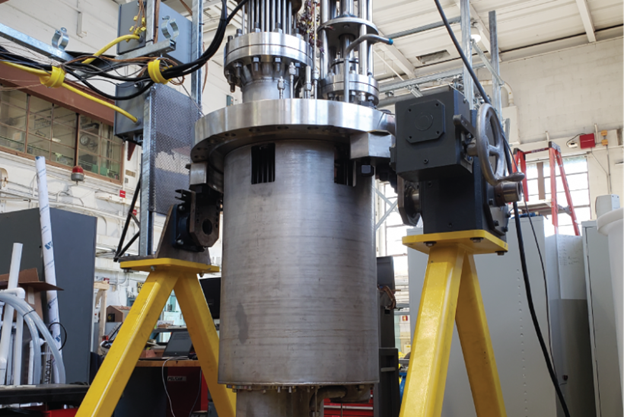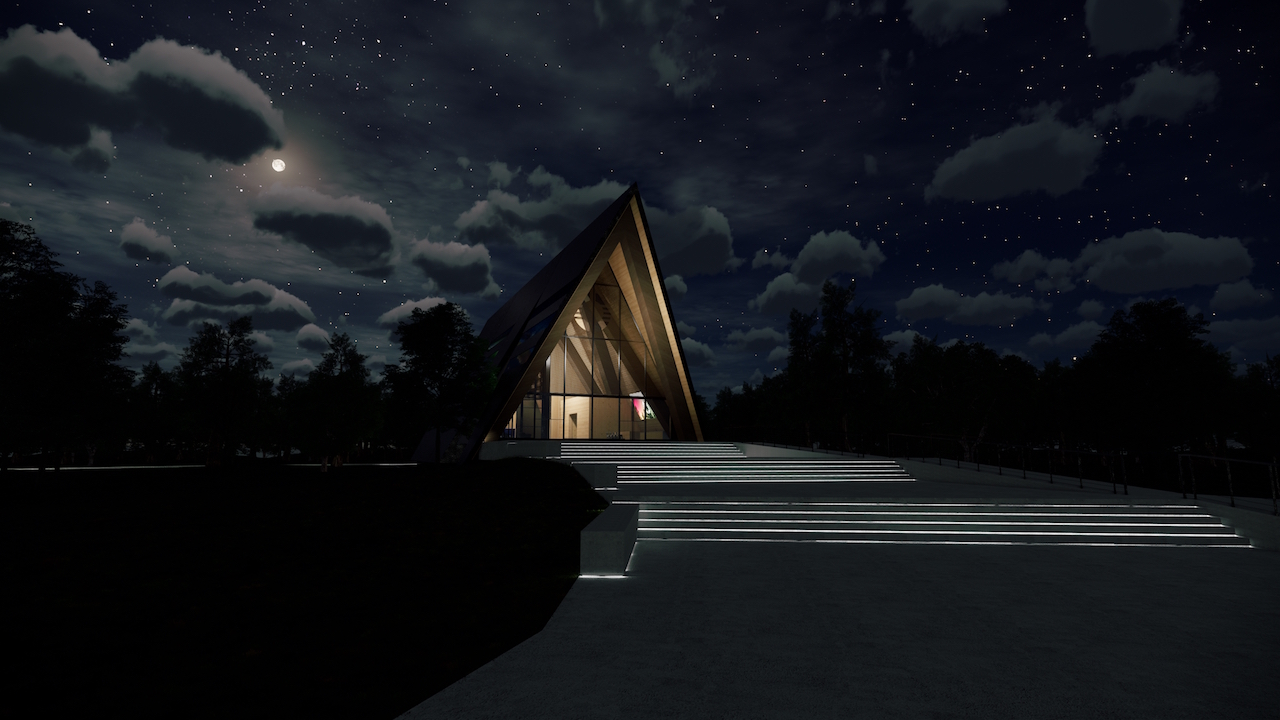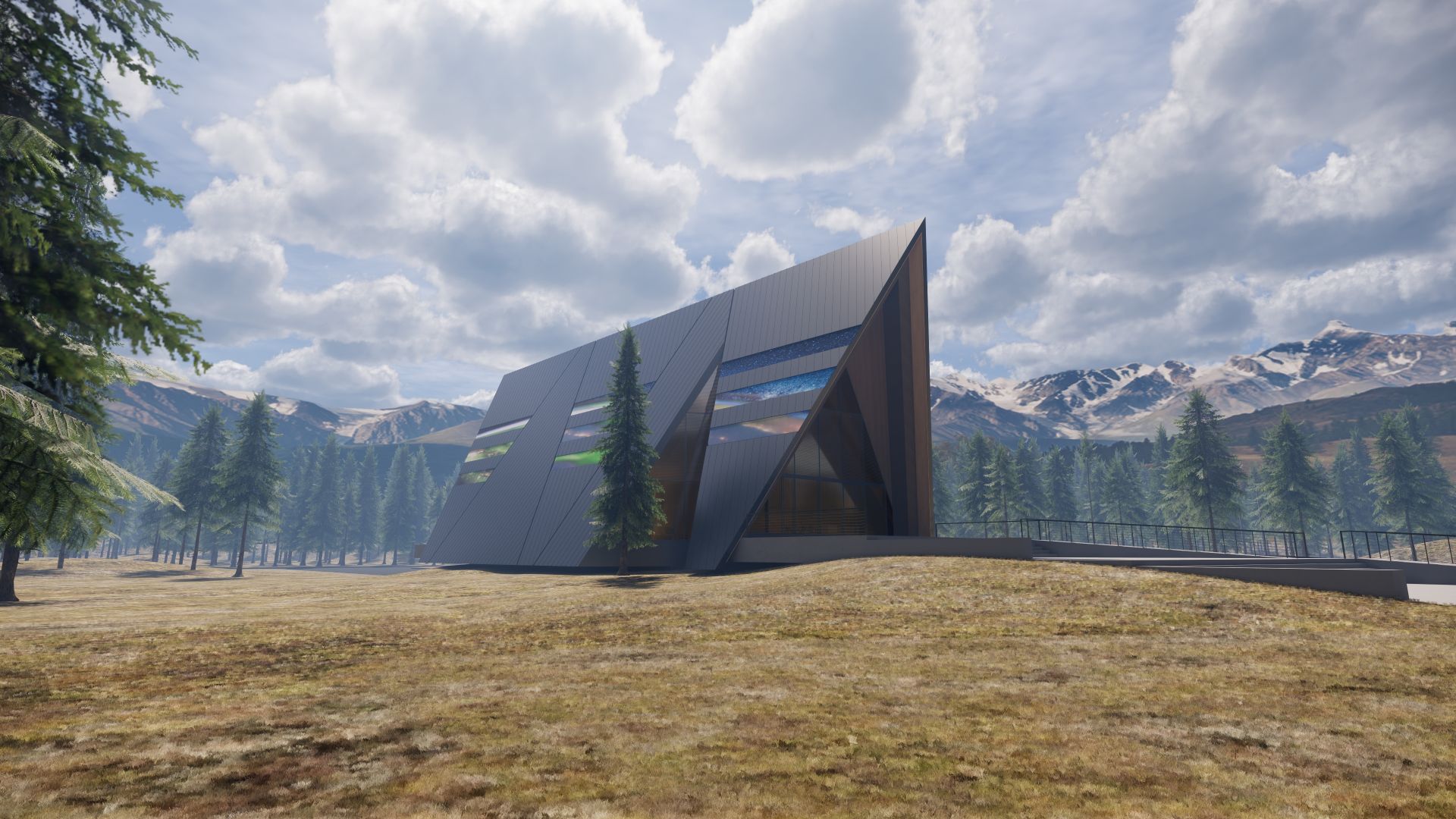Graphic rendition of the Aurora microreactor. (Image: Oklo Inc.)
Some eight months after the Nuclear Regulatory Commission denied Oklo Inc.’s license application to build and operate its Aurora microreactor in Idaho, the company has returned to the regulatory fray. On Wednesday, Oklo announced that it has submitted to the NRC a licensing project plan (LPP) outlining its proposed engagement to support future Aurora licensing activities.
THETA pictured in Argonne National Laboratory’s METL lab. (Photo: ANL)
The Thermal Hydraulic Experimental Test Article (THETA) at Argonne National Laboratory is now operating and providing data that could support the licensing of liquid-metal fast reactor designs by validating thermal-hydraulic and safety analysis codes. The new equipment has been installed in Argonne’s Mechanisms Engineering Test Loop (METL), and its first experiments are supporting data validation needs of Oklo, Inc., by simulating normal operating conditions as well as protected and unprotected loss-of-flow accidents in a sodium-cooled fast reactor.
A screenshot of the panelists for the ANS spent fuel management webinar.
The Department of Energy’s new consent-based process for siting an interim storage facility for the nation’s spent nuclear fuel faces many challenges, but it could be successful if correctly implemented by the department, according to the panelists of the American Nuclear Society’s webinar “Spent Nuclear Fuel Management: Wasting Away or Chance for Progress?” ANS President Steve Nesbit moderated the webinar, held on March 23.
This image is described by the Alaska Center for Energy and Power as a conceptual layout of a generic small modular reactor or microreactor. (Image: ACEP)
Alaska Gov. Mike Dunleavy (R.) introduced “An act relating to microreactors” (SB 177) in the Alaska state legislature on February 1 that would modify existing state law on nuclear energy by specifying that microreactors are not subject to certain nuclear reactor siting and permitting regulations in Alaska. The bill defines a microreactor as an advanced nuclear fission reactor that would be capable of generating no more than 50 MWe.
An artist's rendition of Oklo’s Aurora powerhouse. (Image: Gensler)
The Nuclear Regulatory Commission has denied “without prejudice” Oklo Power’s application to build and operate its Aurora microreactor in Idaho, the agency announced yesterday. The denial, according to the NRC, is due to the California-based firm’s failure to provide sufficient information on several crucial topics regarding the Aurora design.
Still image from the session. From left to right are Judi Greenwald, Harlan Bowers, Simon Irish, Mike Laufer, and Jake DeWitte.
The 2021 ANS Winter Meeting included an executive session on advanced reactor licensing, featuring the leaders of four of the top advanced reactor companies: Mike Laufer, chief executive officer of Kairos Power; Jake DeWitte, CEO of Oklo; Simon Irish, CEO of Terrestrial Energy; and Harlan Bowers, president of X-energy.
Artist’s conception of Oklo’s Aurora powerhouse. (Image: Gensler)
An artist's rendition of Oklo’s Aurora powerhouse. (Image: Gensler)
California-based Oklo has received a $2 million cost-share award from the Department of Energy for the commercialization of advanced fuel recycling capabilities by using electrorefining technology. Oklo is matching $1 million in funds and is partnering with the DOE and Argonne National Laboratory on this public-private partnership, which is intended to help reduce fuel costs for advanced reactor designs while reducing waste by turning used fuel into advanced reactor fuel.


















 The Gateway for Accelerated Innovation in Nuclear (GAIN) announced that three nuclear technology companies—Radiant, Oklo, and Lightbridge—will receive GAIN nuclear energy vouchers to accelerate the innovation and application of advanced nuclear technologies.
The Gateway for Accelerated Innovation in Nuclear (GAIN) announced that three nuclear technology companies—Radiant, Oklo, and Lightbridge—will receive GAIN nuclear energy vouchers to accelerate the innovation and application of advanced nuclear technologies.  The January/February 2021 issue of
The January/February 2021 issue of